Art World
How the Wide Awakes Art Collective Mobilized a Roving Food Truck to Serve Some of New York’s Neediest Neighborhoods
The organizers of the project have served 3,500 meals to date.
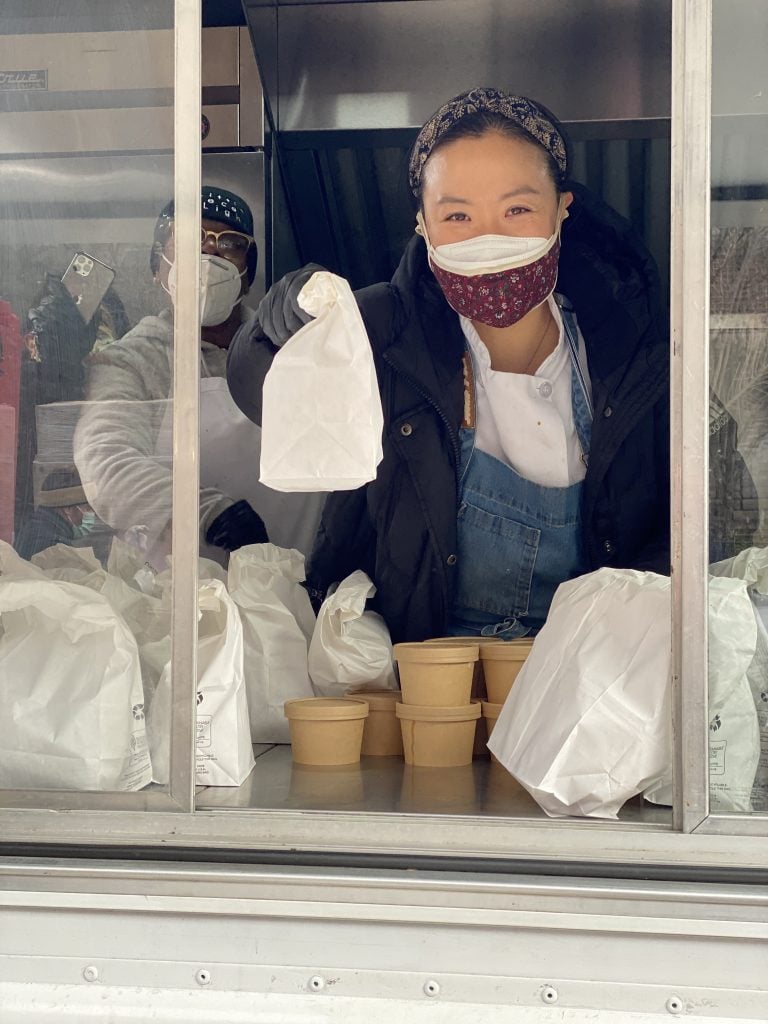
The organizers of the project have served 3,500 meals to date.

Sarah Cascone

In the wake of the 2020 US presidential election, art-world activist collective the Wide Awakes remains dedicated to its collaborative pursuit of greater justice, democracy, and welfare for all. To that end, members have launched the Wide Awakes Mobile Soup Kitchen, a food truck-cum-art project that serves free meals in some of New York City’s most vulnerable communities.
Each Saturday this month, the truck is partnering with the Brooklyn Museum to serve different areas of the borough. It’s also bringing art to the public with a vehicle covered in artworks by Azikiwe Mohammed, Korakrit Arunanondchai, Yto Barrada, Jose De Jesus Rodriguez, and Shepard Fairey. It has served up some 3,500 meals to date.
Running operations is the husband-and-wife team of Andria Hickey, senior director and curator at Pace Gallery, and chef Jason Murphy, who works as an art handler for Bonhams, but on the truck goes by “the Souper.”
In the early pre-pandemic days of the Wide Awakes, Murphy functioned as the collective’s caterer, feeding members during meetings at the Brooklyn Navy Yard. But as the group resumed activities after the height of lockdown, the couple wanted to get more involved.
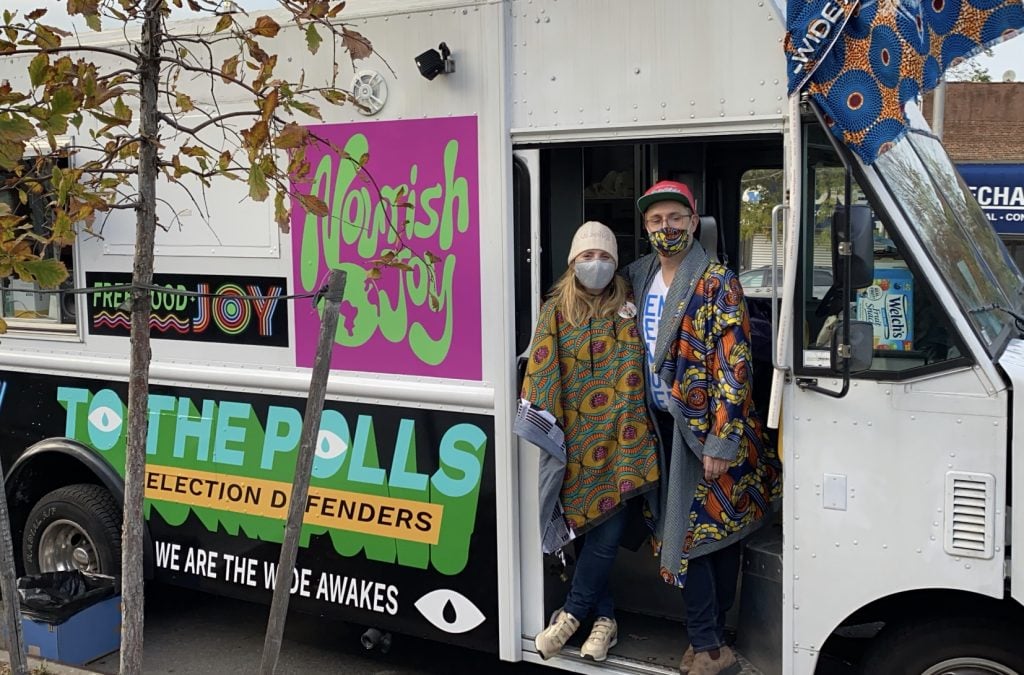
Andria Hickey and Jason Murphy. Photo courtesy of the Wide Awakes Mobile Soup Kitchen.
It was Hank Willis Thomas, a co-founder of the Wide Awakes, who first suggested the idea of a mobile soup kitchen. The idea was a natural fit for Murphy, who was used to feeding hundreds of people from his restaurant career, and had previously partnered with a food bank in Detroit.
“Within a few days, I was planning it,” he told Artnet News.
The project’s first event was for the Wide Awakes March in October, serving soup to participants as they congregated in Washington Square Park after marching down from Harlem. Soon, the couple was looking into ways to help address food insecurity on an ongoing basis.
“It was really starting to come to the forefront, how much damage the pandemic was doing economically,” Murphy said. “And we were seeing it with our own eyes. We were living in Prospect Lefferts Gardens, and on a Saturday you would walk past the food bank and there’d be a line of 500 people. It would stretch for blocks.”
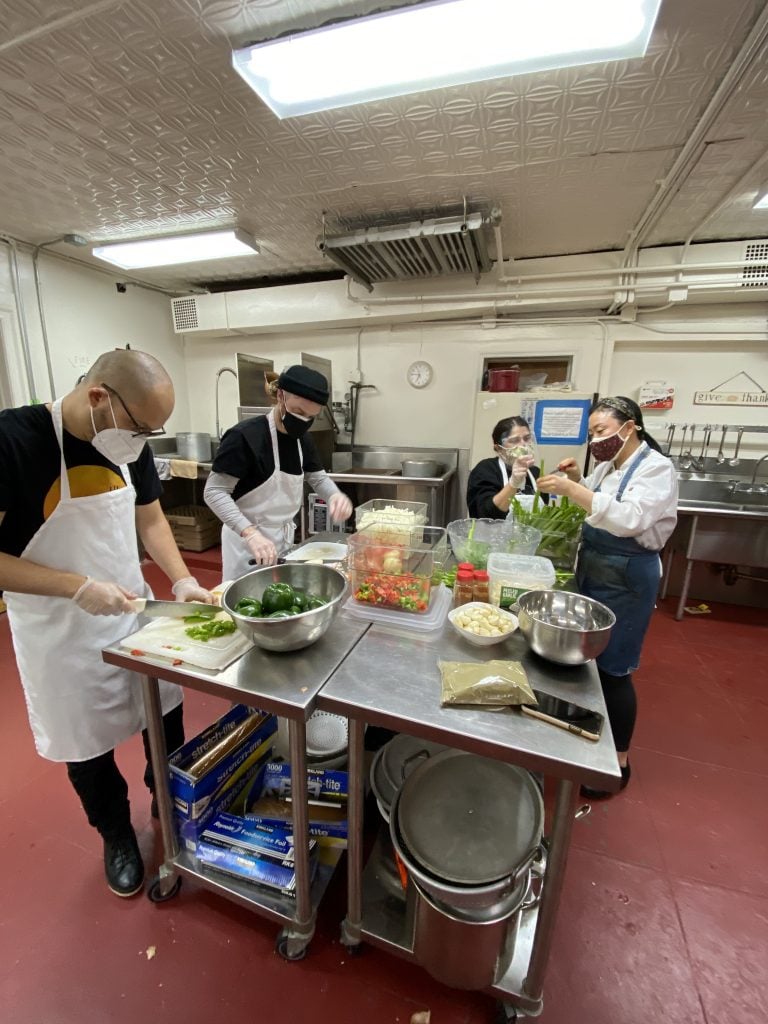
Food prep at the Wide Awakes Mobile Soup Kitchen. Photo courtesy of the Wide Awakes Mobile Soup Kitchen.
Murphy and Hickey rented a food truck and distributed food outside of polling stations in Brooklyn, Queens, and the Bronx on Election Day, November 3. Rirkrit Tiravanija (for whom Murphy works part-time as an assistant) provided a recipe for Thai curry puffs, and arranged for them to prep the food beforehand at the industrial kitchen he built for the shuttered Gavin Brown’s Enterprise space in Harlem.
After the Food Bank of New York City provided a list of local food banks and church programs, the couple began reaching out to see where they could best serve those in need.
The project launched in earnest on New Year’s Day—when most food pantries are closed—thanks to art-world support. Artist Matthew Day Jackson is letting the truck park in his driveway, and the first month’s funding came from donations from artists and friends, as well as James Cohan Gallery, Hauser & Wirth, and Pace.
The Brooklyn Museum—whose president, Anne Pasternak, is a Wide Awakes member—stepped up to cover costs in February and the first week of March. The museum also provided 2,000 free museum passes, each of which admits five guests, to distribute with the meals. (This Saturday, the truck will be at Prospect Lefferts Garden, followed by the Project Eats Brownsville Urban Farm on March 6.)
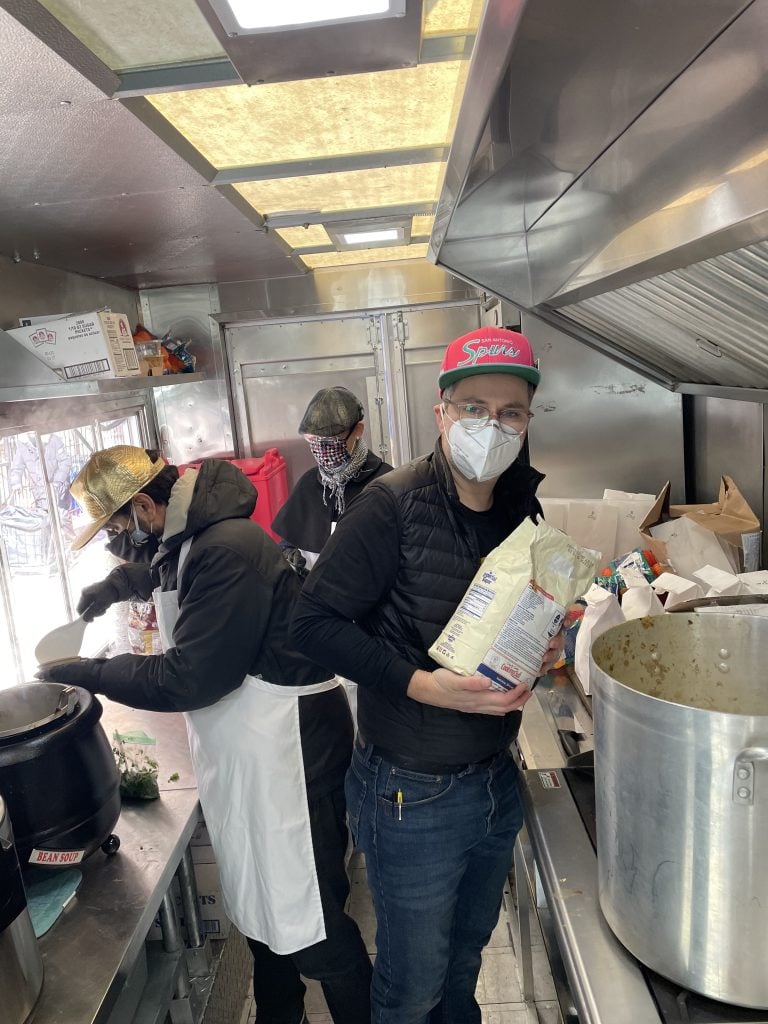
Aboard the Wide Awakes Mobile Soup Kitchen. Photo courtesy of the Wide Awakes Mobile Soup Kitchen.
Throughout, the Wide Awakes Mobile Soup Kitchen has been partnering with Brooklyn Immigrant Community Support, a volunteer group founded by women of color last year. The truck serves meals during the organization’s weekly grocery distributions, which provide 30,000 meals thanks to a partnership with the USDA that runs through April.
A dedicated crew of volunteers has come on board to help prepare and serve the meals. Many are artists: Yto Barrada came on board one weekend to cook and serve her grandmother’s harira recipe, a traditional Moroccan chicken stew.
Comparatively, the 500 or so meals the mobile soup kitchen provides in a day are a drop in the bucket. But the initiative is about more than just food.
“The project is kind of snowballing bigger than we planned originally,” Hickey said. “We’re working a lot right now. I’m not going to lie—we don’t sleep a lot.”
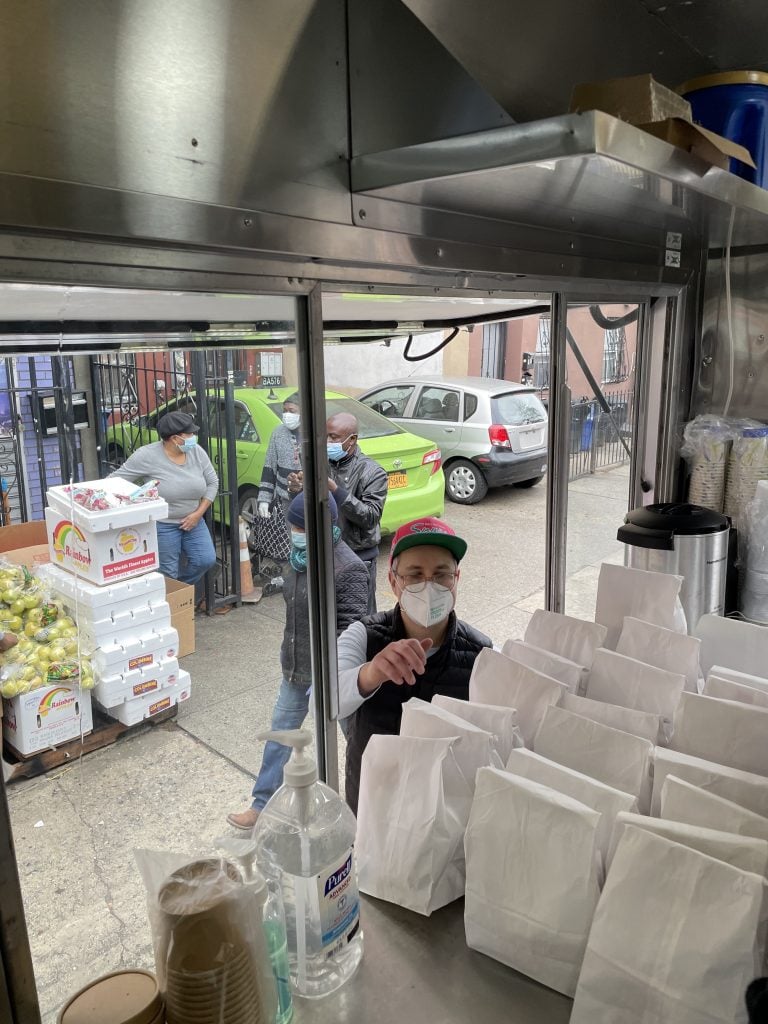
Distributing food at the Wide Awakes Mobile Soup Kitchen. Photo courtesy of the Wide Awakes Mobile Soup Kitchen.
Now, Murphy and Hickey are hoping to launch a Kickstarter to purchase a truck, which would cut out the project’s largest expense, monthly rentals, and possibly pay volunteers. They are also looking for a proper commissary kitchen where they can prepare and store food. Currently, ingredients are kept at the home of friends who have decamped from the city, and meals are prepared at the industrial kitchen at the First Unitarian Church in Brooklyn Heights.
The couple is also thinking about raising money by serving art-world galas as a way of achieving self sustainability for the project. (For now, donations can be made through the Wide Awakes.)
In the meantime, they are trying to reimagine how food distributions are perceived.
“When we show up, the truck is covered in artwork, we have music playing, we throw open the window, and we start handing out hot and ready meals to people who are standing in the line waiting for their pantry items,” Murphy said. “The idea is, how can we add a little joy? How can we destigmatize this? We try to create a party vibe.”
“We think of it as a public art project,” Hickey added. “Because we know that we’re not going to solve food insecurity.”